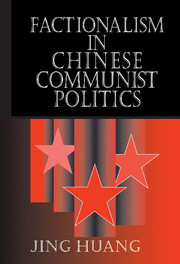Crossref Citations
This Book has been
cited by the following publications. This list is generated based on data provided by Crossref.
Hsieh, John Fuh-sheng
2003.
Democratizing China.
Journal of Asian and African Studies,
Vol. 38,
Issue. 4-5,
p.
377.
Li, Cheng
2003.
The “New Deal”: Politics and Policies of the Hu Administration.
Journal of Asian and African Studies,
Vol. 38,
Issue. 4-5,
p.
329.
Shen, Simon
2004.
Nationalism or Nationalist Foreign Policy? Contemporary Chinese Nationalism and its Role in Shaping Chinese Foreign Policy in Response to the Belgrade Embassy Bombing.
Politics,
Vol. 24,
Issue. 2,
p.
122.
Shih, Victor
2004.
Development, the Second Time Around: The Political Logic of Developing Western China.
Journal of East Asian Studies,
Vol. 4,
Issue. 3,
p.
427.
Heilmann, Sebastian
2004.
Das politische System der Volksrepublik China.
p.
297.
Cai, Hongbin
and
Treisman, Daniel
2006.
Did Government Decentralization Cause China's Economic Miracle?.
World Politics,
Vol. 58,
Issue. 4,
p.
505.
Sonny, Lo
2007.
The Political Cultures of Hong Kong and Mainland China: Democratisation, Patrimonialism and Pluralism in the 2007 Chief Executive Election.
Asia Pacific Journal of Public Administration,
Vol. 29,
Issue. 1,
p.
101.
Zhu, Xufeng
and
Xue, Lan
2007.
Think tanks in transitional China.
Public Administration and Development,
Vol. 27,
Issue. 5,
p.
452.
Shih, Victor
2007.
Partial Reform Equilibrium, Chinese Style.
Comparative Political Studies,
Vol. 40,
Issue. 10,
p.
1238.
2008.
Chinese Economic Development.
p.
555.
Zhu, Xufeng
and
Sun, Bing
2009.
Tianjin Binhai New Area: A Case Study of Multi-Level Streams Model of Chinese Decision-Making.
Journal of Chinese Political Science,
Vol. 14,
Issue. 2,
p.
191.
Shih, Victor
Shan, Wei
and
Liu, Mingxing
2010.
Gauging the Elite Political Equilibrium in the CCP: A Quantitative Approach Using Biographical Data.
The China Quarterly,
Vol. 201,
Issue. ,
p.
79.
Abrami, Regina M.
Malesky, Edmund J.
and
Zheng, Yu
2010.
Vietnam Through Chinese Eyes: Divergent Accountability in Single-Party Regimes.
SSRN Electronic Journal,
2011.
Police Reform in China.
Vol. 20113627,
Issue. ,
p.
71.
Reny, Marie-Eve
2011.
Review Essay: What Happened to the Study of China in Comparative Politics?.
Journal of East Asian Studies,
Vol. 11,
Issue. 1,
p.
105.
Persico, Nicola
Pueblita, José C. R.
and
Silverman, Dan
2011.
Factions and Political Competition.
Journal of Political Economy,
Vol. 119,
Issue. 2,
p.
242.
2011.
Police Reform in China.
Vol. 20113627,
Issue. ,
p.
217.
Su, Fubing
Tao, Ran
Xi, Lu
and
Li, Ming
2012.
Local Officials' Incentives and China's Economic Growth: Tournament Thesis Reexamined and Alternative Explanatory Framework.
China & World Economy,
Vol. 20,
Issue. 4,
p.
1.
Choi, Eun Kyong
2012.
Patronage and Performance: Factors in the Political Mobility of Provincial Leaders in Post-Deng China.
The China Quarterly,
Vol. 212,
Issue. ,
p.
965.
Lin, Kun-Chin
2012.
Politics and the Market in Twenty-First-Century China: Strategies of Authoritarian Management of State–Society Relations.
Political Studies Review,
Vol. 10,
Issue. 1,
p.
73.





